The Hog

The Hog
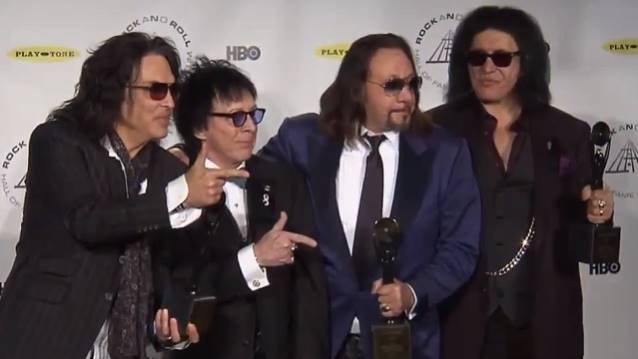 As KISS wind down their touring career, they’ve had a lot of accomplishments, including induction into the Rock and Roll Hall of Fame back in 2014. But while they’ve rocked and rolled many nights, it definitely wasn’t a party every day en route to the Rock Hall, according to Paul Stanley.
As KISS wind down their touring career, they’ve had a lot of accomplishments, including induction into the Rock and Roll Hall of Fame back in 2014. But while they’ve rocked and rolled many nights, it definitely wasn’t a party every day en route to the Rock Hall, according to Paul Stanley.
The singer recently reflected on the Rock Hall induction with 95.7 The Hog, revealing that it wasn’t the best experience for the band, though the fans ultimately got their wishes. “It was validation for our fans, who it meant the world to,” Stanley revealed (as transcribed by Blabbermouth). “It was vindication in the sense that the Rock and Roll Hall of Fame kept us out for 17 years, and were really left with no choice but to begrudgingly let us in.”
The Starchild added, “They treated us like crap, even that night. We had trouble – how about this? – getting into the arena. We had no idea about the rundown of the show or when we were getting onstage. It was disgraceful what they did, but we won. It’s the story of KISS from the beginning – that people who believed in themselves and who were told that what they were doing wasn’t worth anything and wouldn’t succeed came out on top.”
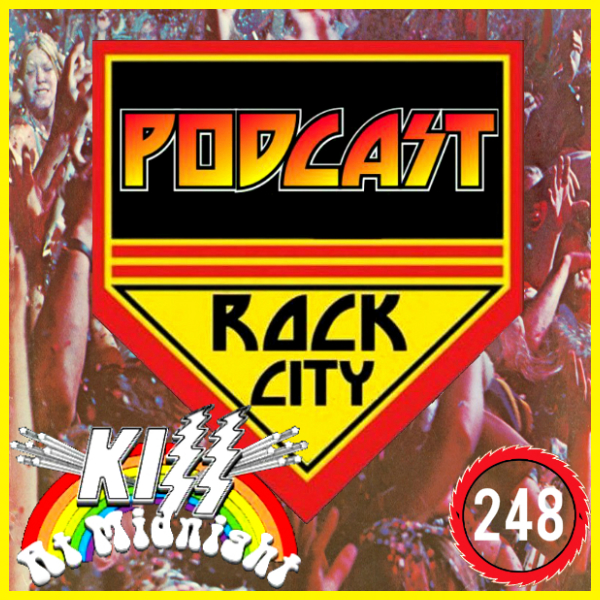 Jody Havenot
Jody Havenot
Michael Brandvold
Entertainment One
|
|
Classic Rock
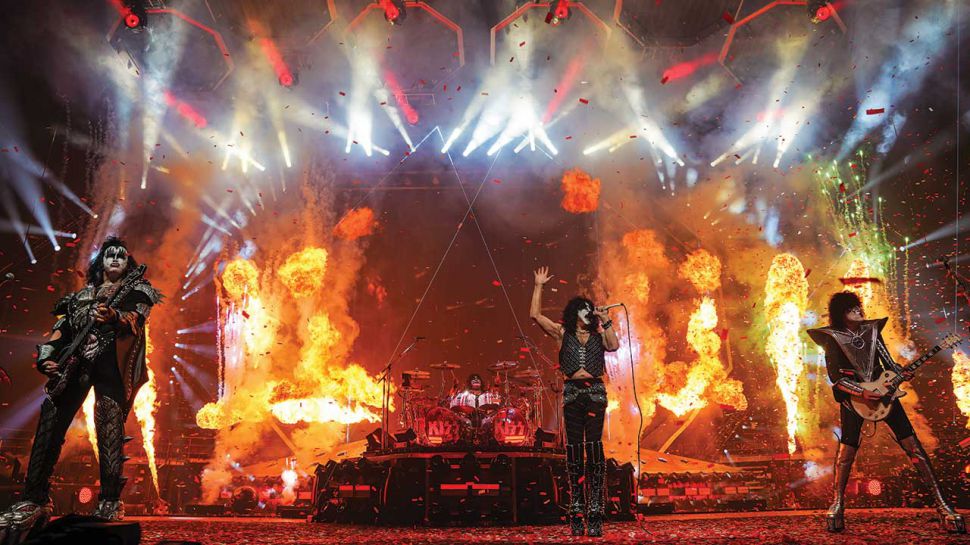
Iggy Pop claimed that he killed the 60s, but it turned out it was four semi-normal guys right off the streets of New York who really drove the final stake through heart of the peace-and-love decade nearly 46 years ago.
Gene Simmons, a former elementary school teacher; Paul Stanley, a cab driver with a heart-shaped face; Peter Criss, a sometime butcher and itinerant drummer who studied under the mighty Gene Krupa; and Ace Frehley, a gang member-cum-liquor delivery man. They stormed out of a $40-a-month fourth-floor walk-up in New York’s Chinatown in their six-inch platforms and sweaty black leather looking like four beasts disgorged from the underworld, and unleashed an unholy and entirely masculine creed of sex, braggadocio, innuendo and conquest, all delivered at a screeching 110 decibels and addressing every young man’s fantasies.
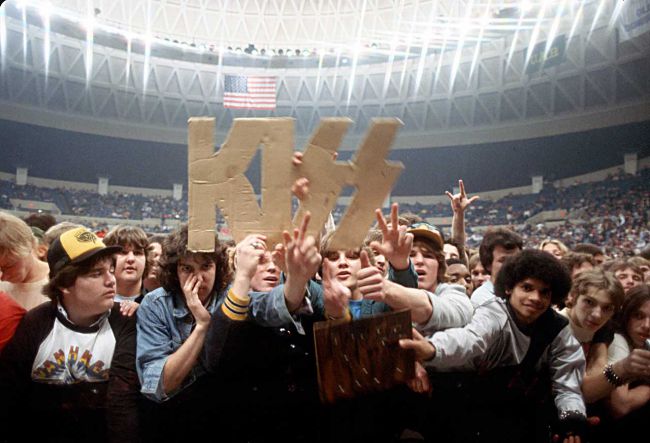 While the band’s message has changed over the years (they’ve become more family-friendly and forswear any cursing during the show), they still attract legions of foot soldiers into the Kiss Army – even now, when they’re calling it quits in one final tour they’ve dubbed the End Of The Road. (They’ve attempted to trademark the term with the US Patent office to prevent any other retiring bands from using it. Good luck with that.) So far, 44 shows have been played in North America, with another 25-date run beginning in August. The European leg begins next week, and there are plans to extend the tour until, probably, mid-2020.
While the band’s message has changed over the years (they’ve become more family-friendly and forswear any cursing during the show), they still attract legions of foot soldiers into the Kiss Army – even now, when they’re calling it quits in one final tour they’ve dubbed the End Of The Road. (They’ve attempted to trademark the term with the US Patent office to prevent any other retiring bands from using it. Good luck with that.) So far, 44 shows have been played in North America, with another 25-date run beginning in August. The European leg begins next week, and there are plans to extend the tour until, probably, mid-2020.
Back at the beginning, the band were fuelled by high ambition, an unrelenting will, a prodigious work ethic and only the most rudimentary of musical talents. But they not only changed the face of musical history by painting it in Stein’s Clown White, they also kicked off their own brand of revolution, putting music back in the hands of the ordinary people and turning it back into a populist manifesto, picking up where Grand Funk Railroad left off by knocking rock music off of its lofty perch, stripping it of its perfect hair, wrecked cool and tight velvet stovepipe pants.
Blabbermouth
KISS frontman Paul Stanley spoke to KTLA 5 Morning News about the band’s “End Of The Road” farewell tour, which kicked off in January and is expected to last for three years.
Asked what his definition of “farewell” is, Stanley said (see video below): “Well, it’s the end of the road, in the sense that we’ve spent 45-plus years touring. And as glorious as it is doing two hours on stage and playing for sold-out houses, really it takes its toll, whether it’s my two torn shoulders that have been repaired, or my bicep tendons, or my knees. I wear them proudly as battle scars.
“I think it’s time,” he continued. “The show that we’re doing right now is the biggest thing we’ve ever done. It’s just state of the art. We’ve done 44 shows so far, all of them sold out, played to half a million people, and we’re just getting started, actually. It’s a big world.”
Asked whether he still spends time practicing his guitar playing, Stanley said: “I’m on stage so much of the time, and we’re playing so often that there’s really no need. But when we rehearse, like for the ‘End Of The Road’ tour that we’re on, we spent about three months rehearsing. Now, we’ve been playing these songs for 45-plus years, but there’s a difference between playing them and really synchronizing, and that synchronicity, that comes from rehearsing. So, we took this very seriously. We wanted the band to be in top form, and if we’re gonna call it quits, it’s great to do it when everybody loves each other rather than everybody’s not talking or the band is on the decline. It seems like the right time for a victory lap, and that’s what we’re doing.”
As most fans remember, back in 2000 and 2001, KISS already performed a “Farewell Tour”. The trek, which was the last to feature drummer Peter Criss, played 142 shows over five legs, covering North America, Japan, and Australia. Stanley later said that the 2000 tour was nothing more than an attempt by the group to “put KISS out of its misery” after years of ego clashes and disagreements over songwriting credits between the band’s original members. Continue reading
Micheal Brandvold
All kinds of autographs at all kinds of prices from a recently purchased private collection.
 Jody Havenot
Jody Havenot
Michael Brandvold
 Former KISS guitarist Vinnie Vincent‘s performance at the “Speedballjamm”, which was scheduled to take place next month at the S.I.R. Soundstage in Nashville, Tennessee, is no longer being advertised on his web site.
Former KISS guitarist Vinnie Vincent‘s performance at the “Speedballjamm”, which was scheduled to take place next month at the S.I.R. Soundstage in Nashville, Tennessee, is no longer being advertised on his web site.
The “Appearances” section of VinnieVincent.com contains no mention of the June 7 event, but includes the following message: “Come see the legendary Vinnie Vincent in person! Vinnie will be appearing at a variety of events for musical performances, meet and greets, autograph sessions, photo ops, and more! Check the listings below for an appearance in your area!”
Vincent‘s “Speedballjamm” appearance was being billed as an intimate event, with only 60 VIP tickets being made available at the cost of $300 per ticket. The performance was supposed to see Vincent backed by his handpicked musicians, Mike Weeks and Chuck White.
Less than a week ago, fans reported via social media that fewer than a dozen tickets had been sold for the “Speedballjamm”.
A representative for S.I.R. confirmed to Ultimate Classic Rock that the show won’t be happening at the venue, explaining that it had been pulled from the schedule this morning and that its only involvement with the event was to rent the space to Vincent.
New York (CNN Business)As the frontman of KISS, Gene Simmons occupies rarefied air — a rock star who entertains arenas filled with adoring fans. On Thursday, Simmons joined another exclusive club, conducting only the second on-camera press briefing at the Department of Defense in the last year.
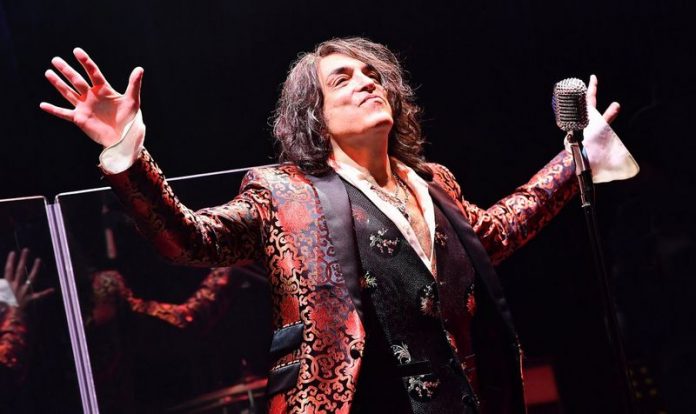 KISS frontman Paul Stanley shared a recent studio photo on his verified Instagram and revealed that he’s working for a new project.
KISS frontman Paul Stanley shared a recent studio photo on his verified Instagram and revealed that he’s working for a new project.
Stanley said that they are recording a new Soul Station album which will mix classic old tunes with the new one.
Here is his statement:
“SOUL STATION ALBUM VOCALS yesterday. Classic old tunes and new. This is really AWESOME.”
mickw85_wyld_ryde_ commented:
“With no disrespect intended…There’s no market for a new KISS album but there is for this? 😕”
3robert62 shared his opinion:
“No kiss album will never match anything as good as 70s kiss😂🤷🏻♂️”
qfinch85 also commented:
“What a stupid thing to say. Revenge from a writing and talent level destroyed 70s kiss. Hell carnival of souls was more talented than 70s KISS. But if you’re not a musician then I guess your album sales to the popular crowd overshadows logic.”
You can see the photo below:
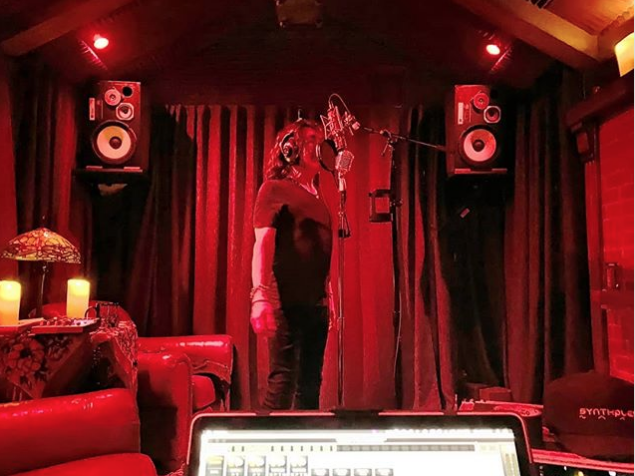
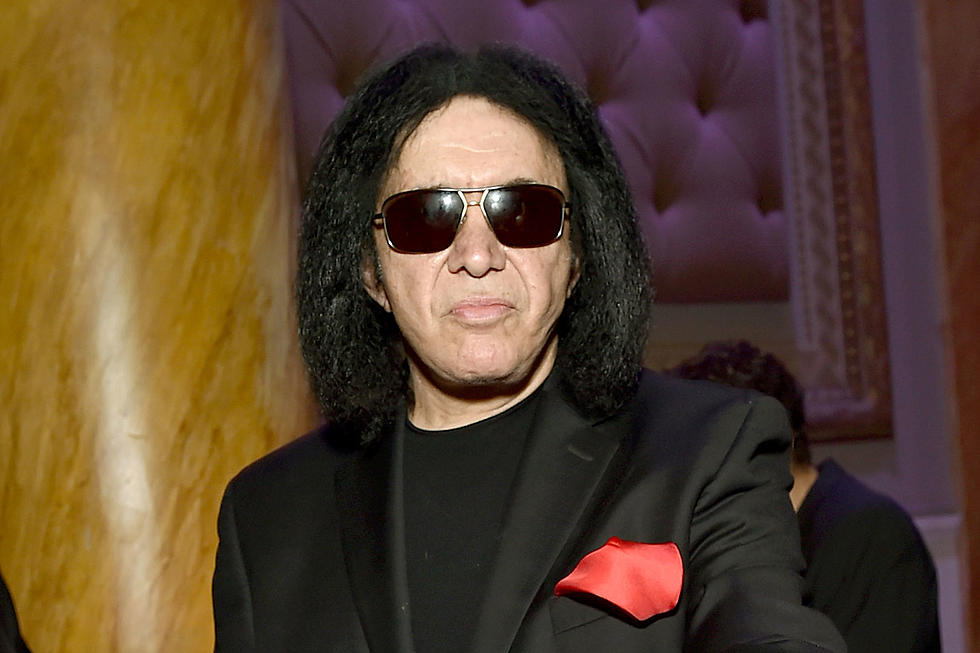 It’s not just rock music that may be “finally dead,” KISS magnate Gene Simmons theorized during a rundown of his favorite songs for MusicRadar last week, but pop as well. The musician asserted Friday (May 10) that the more mainstream side of music is governed by an industry that “sets the rules” and dictates how songs should sound, effectively rendering artists “handcuffed” to such restrictions.
It’s not just rock music that may be “finally dead,” KISS magnate Gene Simmons theorized during a rundown of his favorite songs for MusicRadar last week, but pop as well. The musician asserted Friday (May 10) that the more mainstream side of music is governed by an industry that “sets the rules” and dictates how songs should sound, effectively rendering artists “handcuffed” to such restrictions.
While identifying the Beatles and Little Richard as some of the artists that “blew [his] mind” in his formative years, the KISS bassist and vocalist defended today’s top pop artists while snubbing their business environs.
“These days we have the talent — [Lady] Gaga, Bruno Mars, Adele, all great artists,” Simmons said. “But they’re handcuffed by the industry. The industry sets the rules and says rap has to sound like this; soul has to sound like this; EDM has to sound like this. Fucking pathetic!”
He continued, “I don’t want to sound like one of those miserable, moany guys that says, ‘Man, everything was better back then.’ But when it comes to music… shit, it was so much better! When I heard it, it changed my life forever!”
The recent comments follow Simmons’ frequently dissected takeon the “death of rock”. As he told Esquire in 2014, “Rock did not die of old age. It was murdered. Some brilliance, somewhere, was going to be expressed, and now it won’t, because it’s that much harder to earn a living playing and writing songs. No one will pay you to do it.”
 Jody Havenot
Jody Havenot
Michael Brandvold
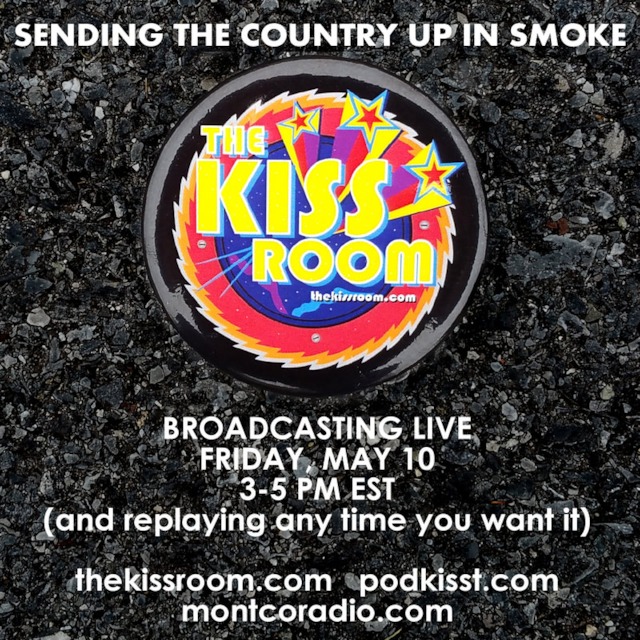 Matt Porter
Matt Porter
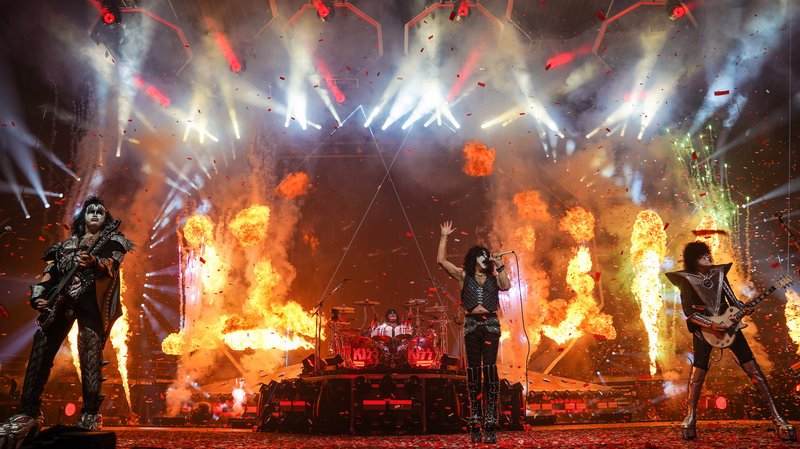 After nearly 50 years, KISS is saying goodbye to touring. The over-the-top purveyors of heavy metal have embarked on a year-long finale tour titled “One Last KISS: End of the Road World Tour.” The 105-stop tour spans North America, Europe, Australia and New Zealand and will encapsulate KISS’ larger-than-life show for the last time.
After nearly 50 years, KISS is saying goodbye to touring. The over-the-top purveyors of heavy metal have embarked on a year-long finale tour titled “One Last KISS: End of the Road World Tour.” The 105-stop tour spans North America, Europe, Australia and New Zealand and will encapsulate KISS’ larger-than-life show for the last time.
Before his storied rock rise, KISS’ lead singer Paul Stanley recalls being a New York cab driver and driving people to Madison Square Garden to see Elvis. He remembers telling himself that night, “One of these days, people are going to be driving here to see me.”
Stanley formed KISS in 1973 along with bassist and back-up vocalist Gene Simmons. Inspired by glam rock, the band was determined to make its performances into an all-encompassing experience.
“As a rock fan I had gone to see bands who oftentimes made you think they were doing you a favor by showing up when I just paid them,” Stanley says. “I think there was a lot of apathy onstage in a sense of complacency.”